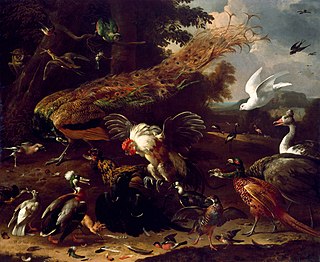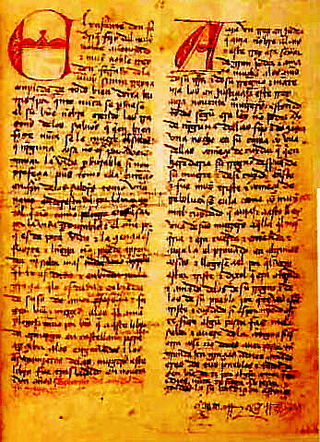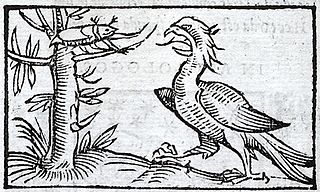
Aesop's Fables, or the Aesopica, is a collection of fables credited to Aesop, a slave and storyteller who lived in ancient Greece between 620 and 564 BCE. Of varied and unclear origins, the stories associated with his name have descended to modern times through a number of sources and continue to be reinterpreted in different verbal registers and in popular as well as artistic media.

The Frog and the Ox appears among Aesop's Fables and is numbered 376 in the Perry Index. The story concerns a frog that tries to inflate itself to the size of an ox, but bursts in the attempt. It has usually been applied to socio-economic relations.
The lion's share is an idiomatic expression which now refers to the major share of something. The phrase derives from the plot of a number of fables ascribed to Aesop and is used here as their generic title. There are two main types of story, which exist in several different versions. Other fables exist in the East that feature division of prey in such a way that the divider gains the greater part - or even the whole. In English the phrase used in the sense of nearly all only appeared at the end of the 18th century; the French equivalent, le partage du lion, is recorded from the start of that century, following La Fontaine's version of the fable.
A wolf in sheep's clothing is an idiom from Jesus's Sermon on the Mount as narrated in the Gospel of Matthew. It warns against individuals who play a duplicitous role. The gospel regards such individuals as dangerous.

The Dog and Its Reflection is one of Aesop's Fables and is numbered 133 in the Perry Index. The Greek language original was retold in Latin and in this way was spread across Europe, teaching the lesson to be contented with what one has and not to relinquish substance for shadow. There also exist Indian variants of the story. The morals at the end of the fable have provided both English and French with proverbs and the story has been applied to a variety of social situations.

The Farmer and the Viper is one of Aesop's Fables, numbered 176 in the Perry Index. It has the moral that kindness to evil will be met by betrayal and is the source of the idiom "to nourish a viper in one's bosom". The fable is not to be confused with The Snake and the Farmer, which looks back to a situation when friendship was possible between the two.

The Wolf and the Lamb is a well-known fable of Aesop and is numbered 155 in the Perry Index. There are several variant stories of tyrannical injustice in which a victim is falsely accused and killed despite a reasonable defence.
The Perry Index is a widely used index of "Aesop's Fables" or "Aesopica", the fables credited to Aesop, the storyteller who lived in ancient Greece between 620 and 560 BC. The index was created by Ben Edwin Perry, a professor of classics at the University of Illinois Urbana-Champaign.
The phrase out of the frying pan into the fire is used to describe the situation of moving or getting from a bad or difficult situation to a worse one, often as the result of trying to escape from the bad or difficult one. It was the subject of a 15th-century fable that eventually entered the Aesopic canon.

The Walnut Tree is one of Aesop's fables and numbered 250 in the Perry Index. It later served as a base for a misogynistic proverb, which encourages the violence against walnut trees, asses and women.

The Fox and the Lion is one of Aesop's Fables and represents a comedy of manners. It is number 10 in the Perry Index.

The Bird in Borrowed Feathers is a fable of Classical Greek origin usually ascribed to Aesop. It has existed in numerous different versions between that time and the Middle Ages, going by various titles and generally involving members of the corvid family. The lesson to be learned from it has also varied, depending on the context in which it was told. Several idioms derive from the fable.
The Crow or Raven and the Snake or Serpent is one of Aesop's Fables and numbered 128 in the Perry Index. Alternative Greek versions exist and two of these were adopted during the European Renaissance. The fable is not to be confused with the story of this title in the Panchatantra, which is completely different.

The Dog and the Wolf is one of Aesop's Fables, numbered 346 in the Perry Index. It has been popular since antiquity as an object lesson of how freedom should not be exchanged for comfort or financial gain. An alternative fable with the same moral concerning different animals is less well known.
Developed by authors during Renaissance times, the story of an ass eating thistles was a late addition to collections of Aesop's Fables. Beginning as a condemnation of miserly behaviour, it eventually was taken to demonstrate how preferences differ.
The Fox and the Mask is one of Aesop's Fables, of which there are both Greek and Latin variants. It is numbered 27 in the Perry Index.

Hercules and the Wagoner or Hercules and the Carter is a fable credited to Aesop. It is associated with the proverb "God helps those who help themselves", variations on which are found in other ancient Greek authors.

The Dogs and the Lion's Skin is a fable ascribed to Aesop and is numbered 406 in the Perry Index. However, it is only found in a mediaeval Greek manuscript claiming to be a translation from the Syriac. The story relates how some dogs, finding the skin of a lion, began to tear it to pieces. Seeing them, a passing fox remarked, "If this lion were alive, you would soon find out that his claws were stronger than your teeth."

The story of the feud between the eagle and the beetle is one of Aesop's Fables and often referred to in Classical times. It is numbered 3 in the Perry Index and the episode became proverbial. Although different in detail, it can be compared to the fable of The Eagle and the Fox. In both cases the eagle believes itself safe from retribution for an act of violence and is punished by the destruction of its young.

"The Lion Grown Old" is counted among Aesop's Fables and is numbered 481 in the Perry Index. It is used in illustration of the insults given those who have fallen from power and has a similar moral to the fable of The dogs and the lion's skin. Parallel proverbs of similar meaning were later associated with it.













